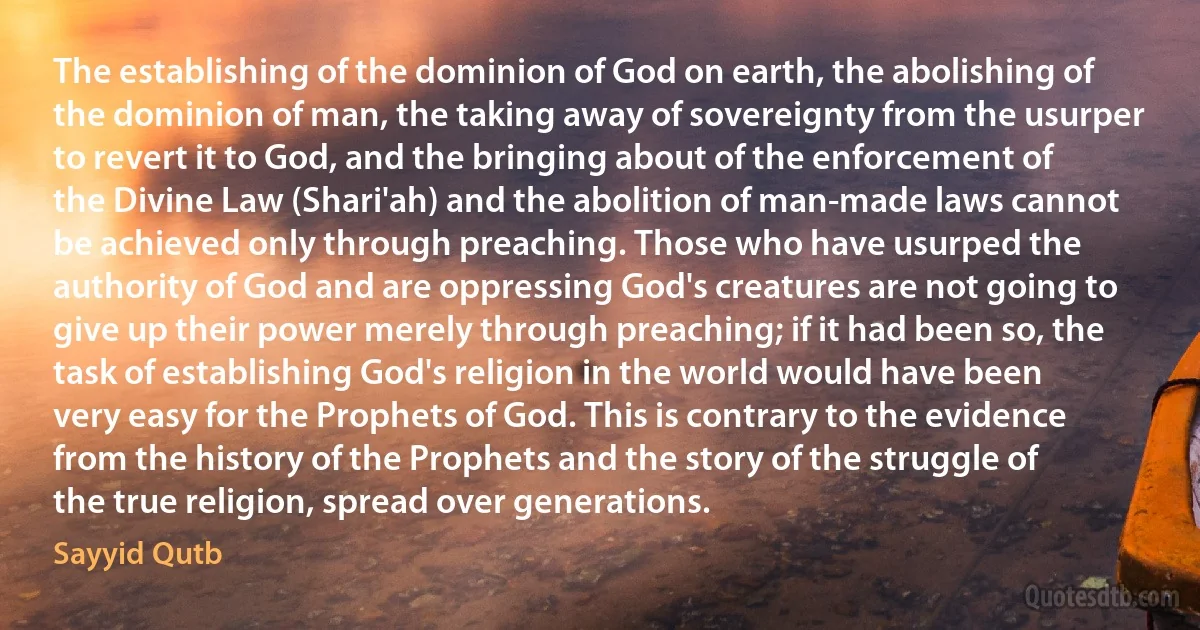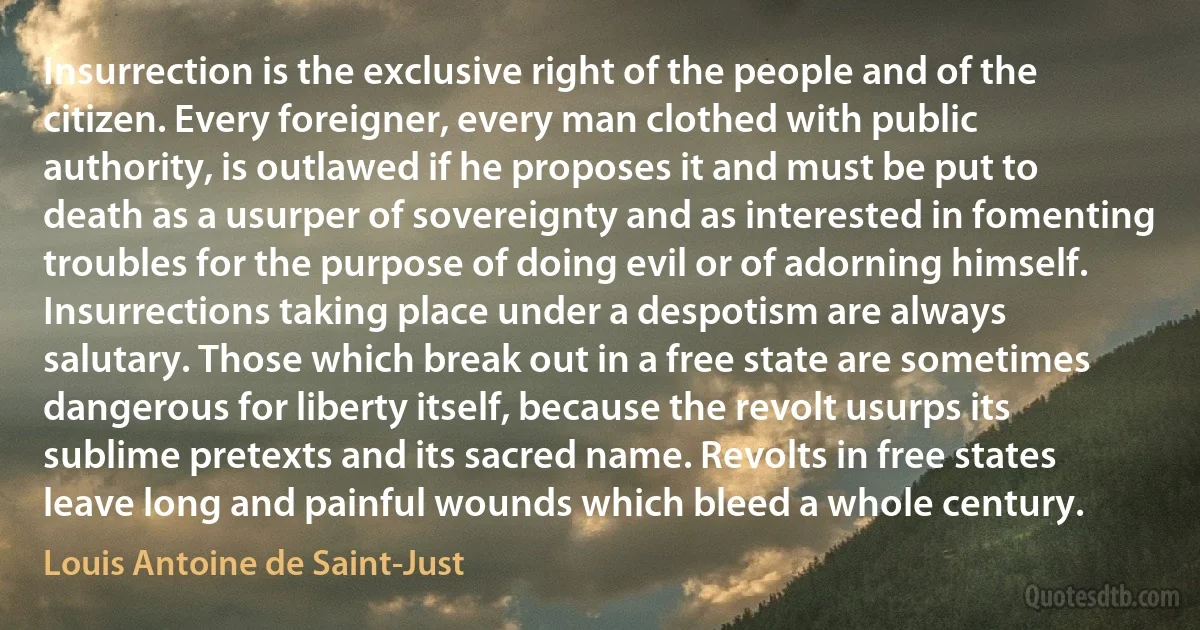Sovereignty Quotes - page 5
The truth is plain to see - if you want freedom, take pride in your country; if you want democracy, hold onto your sovereignty, and if you want peace, love your nation. Wise leaders always put the good of their own people and their own country first. The future does not belong to globalists. The future belongs to patriots. The future belongs to sovereign and independent nations who protect their citizens, respect their neighbours, and honor the differences that make each country special and unique.

Donald Trump
The whole history of the world shows that the Indian intellect is second to none. This must be proved by the performance of a task beyond the power of others, the seizing of the first place in the intellectual advance of the world. Is there any inherent weakness that would make it impossible for us to do this? Are the countrymen of Bhaskaracharya and Shankaracharya inferior to the countrymen of Newton and Darwin? We trust not. It is for us, by the power of our thought, to break down the iron walls of opposition that confront us, and to seize and enjoy the intellectual sovereignty of the world.

Sister Nivedita
We want friendship and co-operation with the people of Spain. But the people of Gibraltar said no to Joint Sovereignty in our referendum of 2002. By 98% we rejected Joint Sovereignty then. But that was obviously not loud and clear enough. So let me be unequivocal so that there is no mistake or any further foolish repetition of this warped notion for the transfer of our sovereignty: Gibraltarian is not for sale. The Gibraltarians will not be bribed. The Gibraltarians will never surrender!

Fabian Picardo
I have a desire to be part of the defence of our sovereignty against the aggression we face every day from our 'friendly neighbour' and those here on the Rock who do not understand the simple words "No Surrender". No surrender of our right to open government, no surrendering of our duties to care for our people, no surrender to the concept that Gibraltarians should find dignified jobs, no surrender of our hopes and dreams for Gibraltar and certainly no surrender of our sovereignty on land or sea.

Fabian Picardo
He (Gauis Gracchus) was a political incendiary. Not only was the hundred years' revolution which dates from him, so far as it was one man's work, the work of Gaius Gracchus, but he was above all the true founder of that terrible civic proletariat flattered and paid by the classes above it, which was through it aggregation in the capital - the natural consequence of the largesses of corn - at once utterly demoralized and made conscious of its power, and which - with its pretensions, sometimes stupid, sometimes knavish, and its talk of the sovereignty of the people - lay like an incubus for five hundred years upon the Roman commonwealth and only perished along with it. And yet again, this greatest of political transgressors was the regenerator of his country. There is scarce a fruitful idea in Roman monarchy, which is not traceable to Gaius Gracchus.

Theodor Mommsen
The time is coming that we have to abolish the concept of separation between church and state. We need a political party centered upon religious ideology. The world of democracy is based upon the ideology of brotherhood. That is why Cain and Abel struggle exists there. Changes of power always head towards the satanic side. This democratic period in human history is passing away. Soon the heavenly sovereignty will be established to lead the world.

Sun Myung Moon
I firmly came out in favor of the independence of nations and sovereignty for the republics. At the same time, I support the preservation of the union state and the integrity of this country. The developments took a different course. The policy prevailed of dismembering this country and disuniting the state, which is something I cannot subscribe to.

Mikhail Gorbachev
It lies not in man's right nor in man's power truly to justify the guilty. This is a miracle reserved for the Lord alone. God, the infinitely just Sovereign, knows that there is not a just man upon earth that doeth good and sinneth not, and therefore, in the infinite sovereignty of His divine nature and in the splendor of His ineffable love, He undertakes the task, not so much of justifying the just as of justifying the ungodly. God has devised ways and means of making the ungodly man to stand justly accepted before Him: He has set up a system by which with perfect justice He can treat the guilty as if he had been all his life free from offence, yea, can treat him as if he were wholly free from sin. He justifieth the ungodly.

Charles Spurgeon
He began to think about semblance, as Ansky had discussed it in his notebook, and he began to think about himself. He felt free, as he never had in his life, and although malnourished and weak, he also felt the strength to prolong as far as possible this impulse toward freedom, toward sovereignty. And yet the possibility that it was all nothing but semblance troubled him. Semblance was an occupying force of reality, he said to himself, even the most extreme, borderline reality. It lived in people's souls and their actions, in willpower and in pain, in the way memories and priorities were ordered. Semblance proliferated in the salons of the industrialists and in the underworld. It set the rules, it rebelled against its own rules...it set new rules.

Roberto Bolaño
It seems to many of us that if we are to avoid the eventual catastrophic world conflict we must strengthen the United Nations as a first step toward a world government patterned after our own government with a legislature, executive and judiciary, and police to enforce its international laws and keep the peace.
To do that, of course, we Americans will have to yield up some of our sovereignty. That would be a bitter pill. It would take a lot of courage, a lot of faith in the new order.
But the American colonies did it once and brought forth one of the most nearly perfect unions the world has ever seen.

Walter Cronkite
It has been said, that the people had already surrendered all their powers to the State sovereignties, and had nothing more to give. But, surely, the question whether they may resume and modify the powers granted to government does not remain to be settled in this country. Much more might the legitimacy of the general government be doubted, had it been created by the States. The powers delegated to the State sovereignties were to be exercised by themselves, not by a distinct and independent sovereignty, created by themselves. To the formation of a league, such as was the confederation, the State sovereignties were certainly competent. But when, "in order to form a more perfect union," it was deemed necessary to change this alliance into an effective government, possessing great and sovereign powers, and acting directly on the people, the necessity of 'referring it to the people, and of deriving its powers directly from them, was felt and acknowledged by all.

John Marshall
The unwelcomed, unwanted, unwarranted, and force-induced intrusion upon the campus of the University of Alabama today of the might of the central government offers frightful example of the oppression of the rights, privileges and sovereignty of this state by officers of the federal government.

George Wallace
It is totally unnecessary for the gentleman to remind me of my coming from a slaveholding state. I know whence I came, and I know my duty, and I am ready to submit to any responsibility which belongs to me as a senator from a slaveholding state. I have heard something said on this and a former occasion about allegiance to the South. I know no South, no North, no East, no West, to which I owe any allegiance. I owe allegiance to two sovereignty, and only two: one is the sovereignty of this Union, and the other is the sovereignty of the state of Kentucky. My allegiance is to this Union and to my state; but if gentlemen suppose they can exact from me an acknowledgement of allegiance to any ideal or future contemplated confederacy of the South, I here declare that I owe no allegiance to it; nor will I, for one, come under any such allegiance if I can avoid it.

Henry Clay



